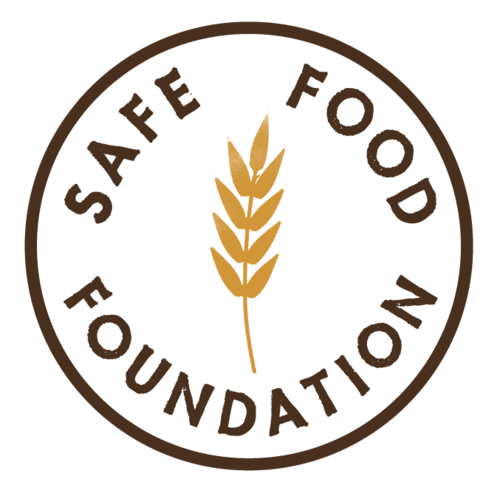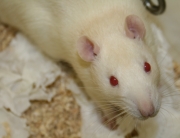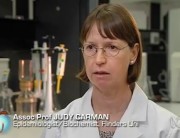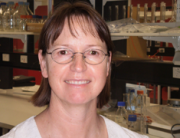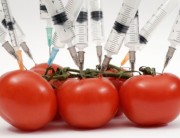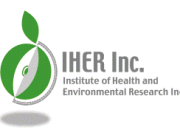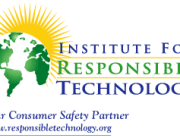Expert scientists warn that genetically modified wheat may cause Glycogen Storage Disease IV, resulting in an enlarged liver, cirrhosis of the liver, and failure to thrive. Children born with this disease usually die at about the age of 5.
Australia is on track to be the first country in the world to grow GM wheat commercially, and to test this in human feeding trials.
Today in Melbourne molecular biologist and risk assessment researcher Professor Jack Heinemann of the University of Canterbury, NZ, and Associate Professor Judy Carman, a biochemist at Flinders University, will release expert scientific opinions on the safety of CSIRO’s GM wheat. These opinions have been reviewed by Dr Michael Antoniou, reader in molecular genetics at King’s College, London.
Professor Heinemann’s expert opinion outlining how CSIRO’s GM wheat silencing technology could transfer to humans is believed to be a world-first, and has been reviewed by scientists in Australia, the UK and Austria.
Australia is on track to be the first country in the world to allow the commercial growing of GM wheat. It is not yet grown anywhere else, nor is there any market worldwide that wants GM wheat. Current GM food crops, like canola and corn, are experiencing fierce resistance across the globe, and there is growing anger in the USA, the birthplace of GM food technology.
Australia has been selected to lead the push for the acceptance of GM wheat and CSIRO is currently conducting field trials of GM wheat in WA, NSW, and the ACT. CSIRO says human feeding trials are planned. It is feared these may already be underway.
Professor Heinemann has studied the similarity in the DNA sequencing of the wheat branching enzyme which makes starch in wheat, and the human branching enzyme which produces glycogen.
CSIRO’s GM technology deliberately suppresses the wheat branching enzyme in GM wheat so there is less starch and the wheat has a lower glycaemic index.
Professor Heinemann says there is strong evidence that siRNA, a type of dsRNA – which is a form of ribonucleic acid, like DNA – when produced in wheat will transfer to humans through food.
“There is strong evidence that siRNAs produced in the wheat will remain in a form that can transmit to humans even when the wheat has been cooked or processed for use in food.
“There is strong evidence that once transmitted, siRNA produced in wheat would have the biological capacity to cause an effect.”
There is also an environmental risk, which the Office of the Gene Technology Regulator (OGTR) appears to have overlooked in allowing field trials. These siRNAs will also transfer to animals that eat the wheat throughout the production chain, including beneficial insects, birds, mammals etc…
Biochemist Dr Judy Carman from Flinders University has reviewed the Heinemann paper and written her own expert scientific opinion outlining the possible disease consequences from the transfer of siRNAs. She says it is likely that if a person eats GM wheat then the siRNA engineered to suppress the wheat branching enzyme would also silence the human branching enzyme.
Both expert scientists are concerned that human consumption of this GM wheat technology – which is not affected by cooking or other processing – could suppress the production of glycogen, which is critical for life.
In her expert opinion, Associate Professor Carman goes on to say: “Consequently it is clear that there is an obvious risk to animals and humans who eat these GM wheat varieties.” She says this could lead to disease and death. In fact, humans born with a genetic form of this disease usually die by the age of 5.
Dr Michael Antoniou, Reader in Molecular Genetics at King’s College, London, has also reviewed and endorsed the Heinemann and Carman expert opinions.
He says it not a question of if there will be gene function disturbances, but to what degree and with currently unknown health consequences. He’s criticised CSIRO, and the regulators, OGTR and Food Standards Australia New Zealand (FSANZ), for not being up to date with the latest developments in the field of RNAi technology and therefore not taking the necessary steps to properly evaluate the safety of the GM wheat.
The research was commissioned for the Safe Food Foundation, an Australian not for profit organisation that campaigns and advocates on food issues.
Safe Food Foundation director Scott Kinnear says the urgent scientific opinions were commissioned after a researcher alerted them to the similarity in the DNA sequencing of the wheat branching enzyme and human branching enzyme.
“Apart from the serious public health risk, the cost to taxpayers and farmers could be significant. It reminds me of CSIRO’s GM field pea project, shelved in 2005, which had allergen like reactions when tested on mice – and a loss to taxpayers of approximately $10 million.
“In this case the testing was done at ANU as we believe that CSIRO lacks the capacity to do proper safety studies. In fact the Australian regulators – FSANZ and the OGTR – do not conduct any safety testing, nor require the safety testing recommended by our safety experts.
“FSANZ and the OGTR rely on GM applicants to do their own safety testing, even though CSIRO has previously demonstrated that it does not have the capacity to do this.”
The Safe Food Foundation calls on CSIRO to immediately release all details of its safety testing on GM wheat for urgent independent scientific review, and immediately release the precise DNA sequences involved so that independent scientists can conduct further urgent checking.
“If CSIRO cannot provide immediate and adequate responses to these issues we call on them to immediately cease all field trials currently underway, stop all plans for human feeding trials, and agree to undertake the recommended safety testing,” Mr Kinnear said.
Continue reading about The Safe Food Foundation’s work on the investigating the safety of GM wheat here.
To interview Professor Jack Heinemann, Dr Judy Carman, or Scott KInnear – Liz Chapman, Safe Food Foundation 0406 005 057
The Safe Food Institute was established to conduct high quality research into issues of food safety and quality. Working in partnership with the Safe Food Institute, the Safe Food Foundation is working to promote awareness of the health, social, economic and environmental effects of food production and consumption.





